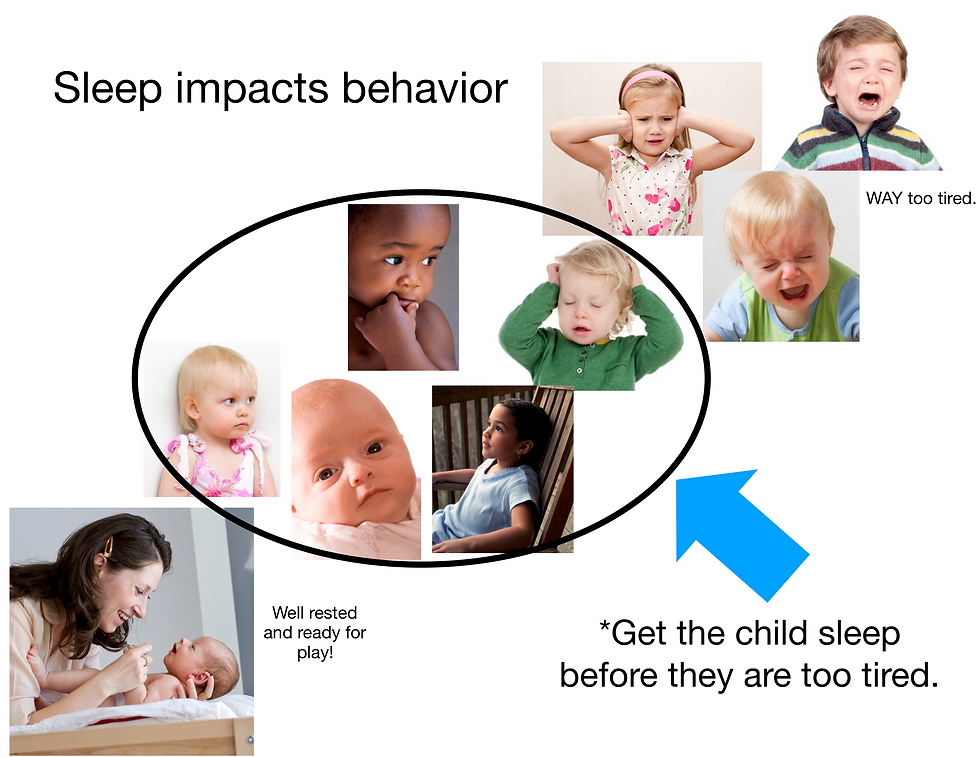Just SLEEEEP! Part 1: Why won't this child sleep?!
- Raelene Ostberg, M.Ed.
- Nov 5, 2019
- 3 min read
Updated: Jan 30, 2024

"Sleeeeeeep! Just pleeeeease go to sleeeep!" I remember saying those words many a naptime and bedtime. I was exhausted and ready to "be done". Thankfully, when my daughters were two and six, I had the privilege to do my student teaching with Mary Sheedy Kurcinka and co-lead a class on "Misbehaving or Missing Sleep." while she was writing the book "Sleepless in America". I learned so much about how to help my two-year-old (and myself) fall sleep.  What's more, a lot of the battles just melted away!
The reality is, when humans do not get enough sleep, we do not behave as well (adults OR children!) Thankfully, there are things we can do to help children learn to sleep well. In this first of three nuggets on this valuable topic, we look at WHY a child might not be getting the sleep they need, and how you might help.
Watch the video or simply read the short article and resources below!
It is worth the effort to ensure young children get the sleep they need. Children need sleep in order both behave well and be at their best. If a child is not getting the sleep they need, they can experience:
*Emotional disruption (lose it over little things, get irritable and easily frustrated, have difficulty calming, and experience stomach aches and anxiety)
*Body disintegration (more falls, hyper activity, lash-out behaviors like throwing, hitting, and yelling, and will get sick more frequently)
*Less ability to focus, attend and perform (need more attention and help to stay on task, talk excessively, experience difficulty making decisions, do not listen, do not perform at peak level or resist performing, and is more forgetful)
Here are five steps to figure out if sleep is the issue and what to do about it.
1) Track children's patterns to discover their sleep (and awake) needs!
Use this FREE Sleep Log! Notice if they wake up spontaneously or you have to wake the child. Observe, over time, what might be impacting a child's sleep.
2) Measure and compare. How much sleep does your child need? Are they getting enough?
Newborns (0-3 months) Recommended: 14-17 hours May be appropriate: 11-13 hours (Not less than 11 hours) to 18-19 hours (Not more than 19 hours)
Infants (4-11 months) Recommended: 12-15 hours May be appropriate: 10-11 hours (Not less than 10 hours) to 16-18 hours (Not more than 18 hours)
Toddlers (1-2 years) Recommended: 11-14 hours May be appropriate: 9-10 hours (Not less than 9 hours)15-16 hours (Not more than 16 hours)
Preschoolers (3-5 years) Recommended: 10-13 hours May be appropriate: 8-9 hours (Not less than 8 hours)14 hours (Not more than 14 hours)
Resource: https://www.sleepfoundation.org/excessive-sleepiness/support/how-much-sleep-do-babies-and-kids-need
3) Avoid the culprits that undermine sleep. Sleep can be impacted by medical issues, development, stress, temperament, sleep habits, and the environment. Ask yourself, how often do these occur? All of these get in the way of you and your child's sleep. What's more, YOU can impact these!
Irregular bedtimes or mealtimes?
Rough housing and/or exercise after dinner?
High stimulation levels throughout the day?
Sleep associations that change from bedtime to the middle of the night?
Busy environment before bed?
A day without relaxed connection time?
Night time errands?
More than 60 minutes of screen time?
Naps after 3pm?
Too little exercise to time to move?
Caffeine or sugar?
4) Watch for cues. Over tired and wired = more battles.
Even small infants send a message when fatigue is setting in. If you miss the window, it will be more difficult for the child to effectively and calmly go to sleep.
5) When you see the signs, GET CHILD TO SLEEP ASAP – in a very relaxed manner. Note the time. Tomorrow, start the routine 15 minutes earlier.

For more information on upcoming webinars and on-demand courses, check out https://www.thriving-together.com/trainings










Hi thhanks for posting this